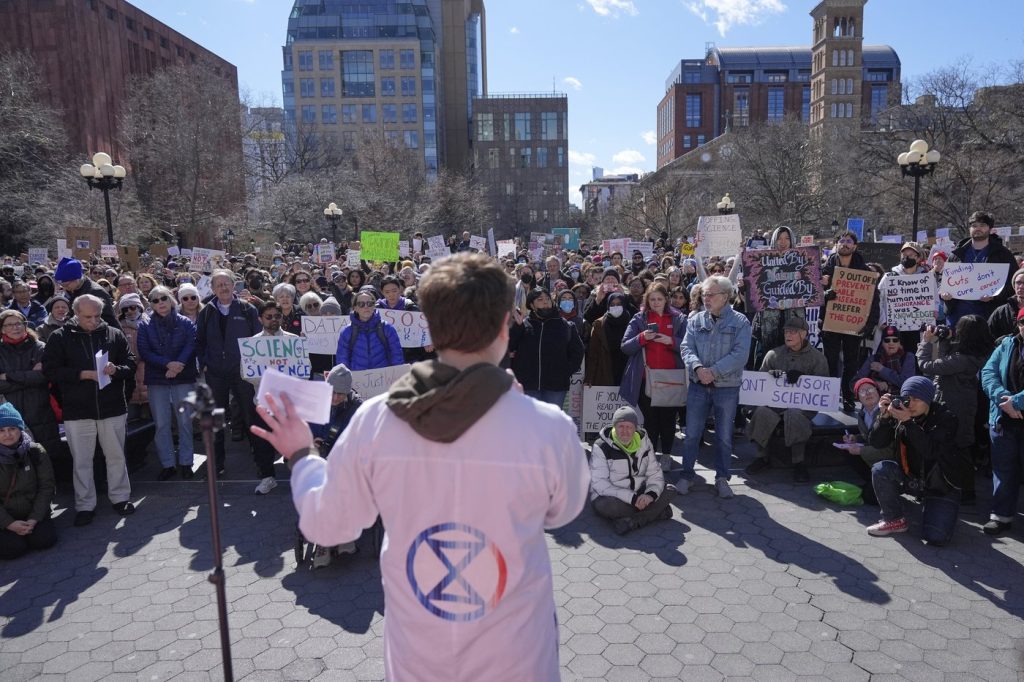Connor Phillips, a research fellow at the National Institutes of Health (NIH), was born three months premature with cerebral palsy. His life was saved by the very science he now studies, specifically brain processes. Inspired by his own journey, Phillips aspired to continue his research through a partnership with Brown University, where he was invited to interview for a doctoral program in neuroscience. However, his plans have been disrupted by training program suspensions at the NIH, a consequence of funding cuts implemented by the Trump administration.
Phillips is currently exploring other graduate programs while hoping for a reversal of policies that strain scientific research. He expressed, “You don’t take these jobs that pay worse and have insane hours unless you care about helping others and translating our love for science into something that can improve people’s lives.” Nevertheless, federal support for research at universities has been reduced, affecting young scientists’ career prospects by limiting access to essential projects and programs.
Additional challenges are posed as many universities cut back their admissions offers amid uncertainty regarding future funding. Moreover, there are reports of hiring freezes as the Trump administration threatens to withdraw federal funding over various administrative issues, including handling complaints related to antisemitism and diversity initiatives.
Mira Polishook, a research technician from Duke University, found her own plans derailed when a graduate program she applied to attributed its inability to admit her to governmental decisions impacting funding. She has applied for the National Science Foundation's Graduate Research Fellowship, which typically guarantees funding for three years but has recently left applicants in limbo regarding awards and overall availability of funding.
The NIH funding cuts have faced a legal challenge from 22 states, as well as organizations representing universities and research institutions, but the resultant uncertainty has already led to project delays and cuts from other funding agencies like USAID and the National Science Foundation (NSF). Emilya Ventriglia, president of UAW 2750, representing approximately 5,000 early-career researchers at NIH, noted that some graduate programs have halved their admission numbers or halted them altogether. “At this rate, with the hiring freeze, there may be no Ph.D. students next year if it’s not lifted soon,” she warned.
Ventriglia’s own research on brain responses to antidepressants has been hindered, as her plans to recruit a new researcher have stalled, compounded by fears that new purchasing restrictions could prevent her from obtaining necessary materials for experiments. Levin Kim, president of a union representing 8,000 academic workers at the University of Washington, commented, “We’re expecting this to play out for generations.”
The emotional and financial strain on students navigating this uncertainty is significant. Natalie Antenucci, a first-year graduate student at the University of North Carolina, articulated her passion for her work in studying how social experiences impact health, emphasized the importance of NIH funding for her research, and expressed concern about her financial inability to continue absent that support.
In light of these developments, some American students are considering opportunities abroad. Marleigh Hutchinson, nearing graduation from Kansas State University with a degree in environmental engineering, has noted the lack of job prospects in the U.S. for graduate teaching positions or research roles amidst ongoing uncertainties. She has expressed a desire to focus on international development and food and water security issues, stating, “If that’s something the United States is no longer going to value, then I would like to go somewhere else.”
At the University of Nebraska, a research institute dedicated to improving agricultural water management had to retract an offer to host a doctoral candidate from Ghana after losing USAID funding. Nicole Lefore, associate director of the Daugherty Water for Food Global Institute, expressed concerns about the potential diplomatic repercussions of reduced educational opportunities for foreign students. She noted that such losses weaken the soft diplomatic ties built through years of collaboration in agriculture and education, stating, “The only winner out of this is China,” as countries cut off from U.S. initiatives may turn elsewhere for support.











